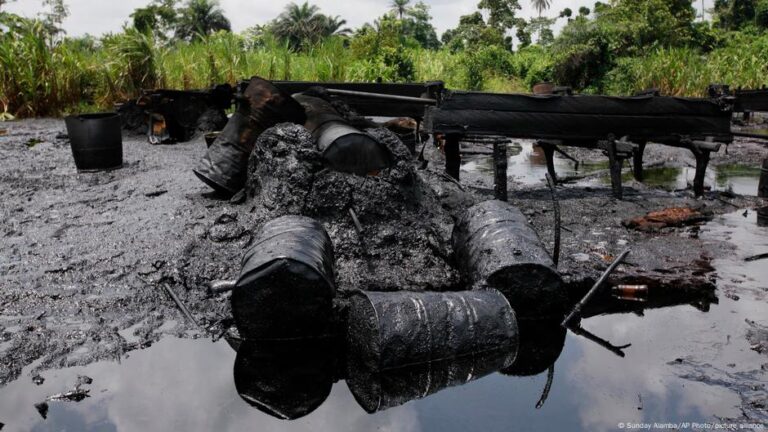The Economic and Financial Crimes Commission (EFCC) has reaffirmed its commitment to combating illegal oil bunkering in Nigeria, stating that its operatives conduct petroleum product testing to safeguard supply integrity and curb illicit activities in the sector.
In a statement released on Saturday, the EFCC cautioned petroleum marketers, particularly in Akwa Ibom State, against engaging in unethical practices such as procuring and selling adulterated fuel. This warning was issued by the Uyo Zonal Director of the EFCC, Assistant Commander of the EFCC (ACE 1) Oshodi Johnson, during a courtesy visit by representatives of the Independent Petroleum Marketers Association of Nigeria (IPMAN), Akwa Ibom State Coordinating Committee.
A Nationwide Crackdown on Oil Crimes
This development is part of Nigeria’s ongoing efforts to dismantle illegal refineries and curb crude oil theft, which has resulted in significant financial losses for the country. Reports indicate that Nigeria loses billions of dollars daily due to crude oil theft, impacting its daily oil production output and overall economic stability.
IPMAN Seeks Clarification on EFCC’s Petrol Testing Role
During the meeting, IPMAN Chairman Comrade Francis Udeyen sought clarification on the EFCC’s mandate concerning the testing of petroleum products. He questioned the Commission’s legal authority in the petroleum sector and its role in evaluating fuel quality.
“We need to understand the EFCC’s involvement in our business operations,” Udeyen stated, emphasizing the need for transparency and collaboration in regulating the industry.
EFCC’s Response and Justification
In response, Oshodi Johnson explained that the EFCC’s fuel testing measures are part of its strategy to detect and eliminate illegal oil bunkering activities that compromise fuel quality and disrupt the legitimate supply chain.
“Our testing processes are essential for identifying illicit petroleum products and ensuring the integrity of supplies across Nigeria. The EFCC recently launched a state-of-the-art forensic laboratory in Port Harcourt, equipped to conduct high-standard analyses,” Johnson revealed.
He further assured IPMAN members of continued collaboration to eliminate fuel adulteration and ensure that only legally sourced products enter the market.
A Stern Warning to Industry Stakeholders
Oshodi also warned petroleum marketers against engaging with illegal oil bunkerers, emphasizing the economic and legal consequences of such actions.
“If you are not aiding, abetting, or conspiring with illegal bunkerers, then you have nothing to fear. However, those who engage in these unlawful activities should be prepared to face the full wrath of the law,” he declared.
He reiterated that the EFCC is legally empowered to investigate and prosecute cases related to oil bunkering and financial crimes, and the agency will take decisive action against violators.
The Path Forward
The EFCC’s firm stance on testing petroleum products and monitoring the industry aligns with Nigeria’s broader efforts to sanitize the petroleum sector. With enhanced forensic capabilities and increased regulatory oversight, the agency remains determined to root out corruption and safeguard the nation’s oil resources.
The message to petroleum marketers is clear: adherence to legal and ethical practices is non-negotiable, and collaboration with regulatory bodies is crucial in ensuring a transparent and efficient energy sector.

